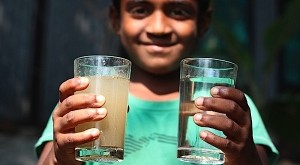Crowdsourcing for a Better World
 If one or two minds can solve complex, seemingly intractable problems, just think what hundreds or thousands of brilliant brains can achieve. The potential and power of the crowd may well be helping companies to drive up their profits through innovations, but the paradigm is also one of the proven methodologies being used to tackle complex social issues and humanitarian problems.
If one or two minds can solve complex, seemingly intractable problems, just think what hundreds or thousands of brilliant brains can achieve. The potential and power of the crowd may well be helping companies to drive up their profits through innovations, but the paradigm is also one of the proven methodologies being used to tackle complex social issues and humanitarian problems.
IdeaConnection’s solvers recently supplied Chemists Without Borders with a number of novel solutions to help mitigate problems caused by arsenic poisoning in Bangladesh. But a little look at the crowdsourcing landscape will reveal numerous examples of the crowd being put into action for the common good.
3-D Printing Prosthetic Arms
Crowdsourcing is helping to rebuild lives in war-ravaged Sudan, a country that has long been beset by conflict. A California-based media and technology company is using crowdsourcing and 3D printers to help teenage amputees.
Inspired by the story of a 14-year-old boy who had lost both his arms in a bomb blast, Mike Ebeling, founder and CEO of Not Impossible Now decided to look for a way to help. He crowdsourced ideas with doctors, surgeons, inventors, a printing company and many others.
The result of Project Daniel is a 3D printer that can create prosthetic arms and hands. The team managed to track down Daniel and created his prostheses, allowing him to do things that he hadn’t been able to do for two years, such as feed himself. Ebeling and his colleagues also taught people in the area how to use the technology so they can make their own prostheses for amputees.
Crowdsourcing Better Disaster Management
A prototype mobile Android app, code named “uRep,” is currently being developed at Kean University, New Jersey and could help to crowdsource solutions following manmade or natural disasters. The program, outlined in a paper, Crowdsourcing for Public Safety allows users to report a problem by taking a picture and geo-tagging it using their mobile device’s GPS functionality. The aim is to provide accurate information during emergency situations to allow for speedier and more accurate responses. The paper mentions one of its inspirations: the problems experienced during Hurricane Sandy, the most destructive hurricane of the 2012 Atlantic hurricane season.
Crowdsourcing Rape Laws
In the UK, the Guardian newspaper has teamed up with advocacy organization Equality Now to help crowdsource rape laws around the world. Currently, members of the public are being asked to fill in a short survey to contribute to a database of global rape laws.
Add your Comment
[LOGIN FIRST] if you're already a member.fields are required.
